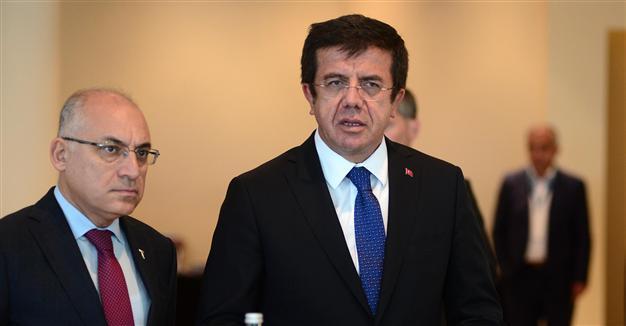Turkish gov’t seeks compensating businesses’ losses from upcoming minimum wage hike
ANKARA

Economy Minister Nihat Zeybekci answering questions after delivering a speech at the Belarus Business Forum in Istanbul on Nov. 12, 2015. AA Photo
The Justice and Development Party (AKP) is looking for ways to ease the burden on companies amid concerns by business representatives about an upcoming hike in the minimum wage.
Prime Minister and AKP leader Ahmet Davutoğlu conducted a seven-hour meeting late Nov. 11 with representatives of employers and employees, listening to the expectations of all parties. Other labor market items were also on the table, daily Hürriyet has learned.
Business leaders warned the PM that layoffs could begin and some facilities would be forced to be closed if the conditions are not eased.
The AKP promised before the Nov. 1 elections a 30 percent rise in the minimum wage from the current 1,000 Turkish Liras. The rise tends to have an upward effect on other wages.
Economy Minister Nihat Zeybekci said Nov. 12 that the government is considering Treasury benefits if companies, especially SMEs, producers and exporters face any risks or losses.
“Such a study in in making and the figures will become more concrete soon,” he said, while speaking at the Belarus Business Forum in Istanbul.
Employers’ representatives, including the heads of the Turkish Union of Chambers and Commodities Exchanges (TOBB), the Turkish Industry and Business Association (TÜSİAD) and the Turkish Confederation of Employers’ Unions (TİSK), demanded an ease in social security fees as they also discussed flexible working conditions in exchange.
Rifat Hisarcıklıoğlu, the head of the Turkish Union of Chambers and Commodities Exchanges (TOBB), said earlier that he supported the wage rise but that the costs for companies, which currently stands at 1,500 liras, should be kept unchanged, meaning less tax would be paid for each employee.
Kani Beko, head of the Confederation of Progressive Trade Unions of Turkey (DİSK), said at the meeting that his organization would not compromise on any current severance payment rights, referring to the money employees receive when they are laid off or retire. He also said work security conditions were way too poor.
Davutoğlu told the parties that such a decision on severance would be made anonymously.
Former ministers Ömer Çelik, Ali Babacan, Mehmet Şimşek, Cevdet Yılmaz, Faruk Çelik, and the AKP’s deputy leader responsible for the economy, Naci Ağbal, were also present at the meeting.
On Nov. 12, Hikmet Tanrıverdi, the president of Istanbul Textile and Apparel Exporter Associations (İHKİB), said the ready-wear sector would face a big problem if the losses deriving from the hike are not compensated and would shift production to countries such as Bulgaria, Egypt, Moldova, Romania and Slovakia to remain competitive.
Textiles remains a leading exports item for Turkey, where 1 million people are employed.
“A third of sales revenue goes to wages in the tourism industry, above that level and the alarm bells will ring,” Reuters quoted Timur Bayındır, the head of Turkey’s main hotels industry association, as saying.
“If we pass wage hikes onto our prices we lose our competitiveness in the Mediterranean region. Before new wages are implemented, we may see job cuts.”
There are around 12 million employees in Turkey and some 5 million of them are paid the minimum wage, at least on paper. However, some companies illegally tend to show wages lower to avoid higher fees.
The Istanbul Chamber of Commerce has calculated the cost of the hike for business at 16 billion Turkish Liras.
Ümit Özlale, an economics professor at Istanbul’s Özyeğin University, said the hike would likely cost Turkish companies around 26.4 billion liras, or roughly 1.5 percent of GDP at 2014 prices.
The annual growth in real wages has averaged 5 percent over the last five years, while labor productivity increased by 1.5 percent a year during the same period, state statistical data shows.
